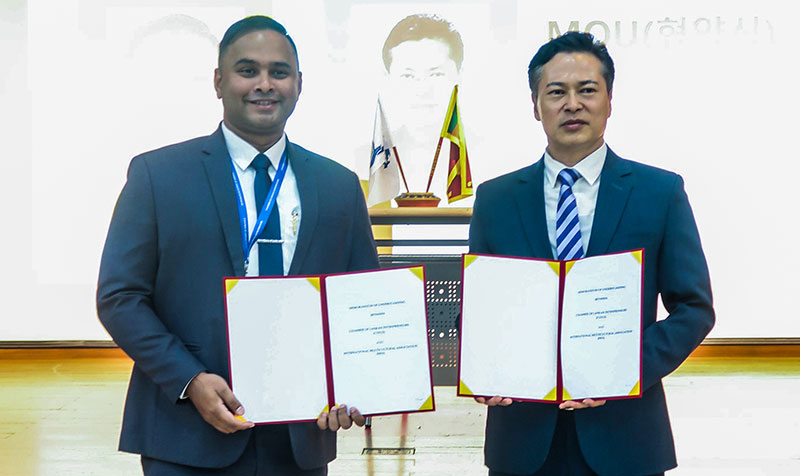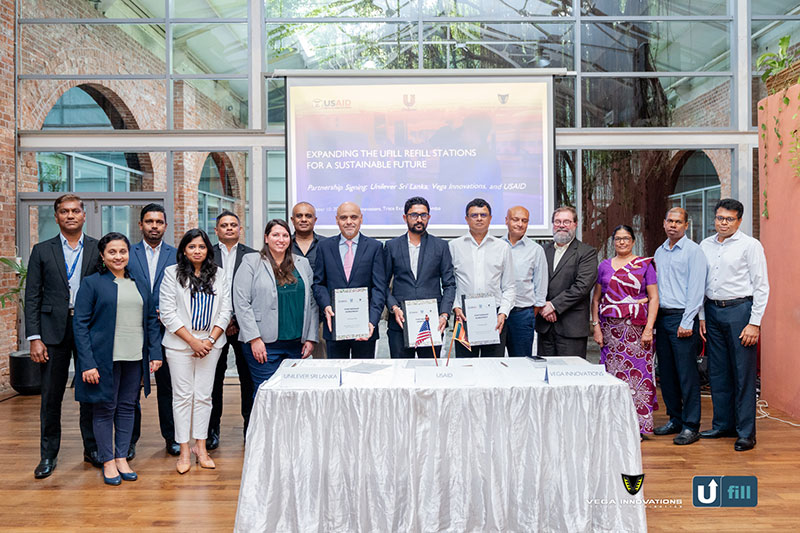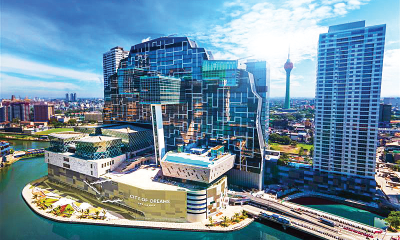Business
COYLE’s trade delegation to South Korea forges new business alliance

The Chamber of Young Lankan Entrepreneurs (COYLE) recently led a high-profile trade delegation to the Republic of Korea, marking a significant milestone for the Sri Lankan business industry. This visit, commemorating the chamber’s 25th anniversary, aims to strengthen economic ties and open up new business avenues between Sri Lanka and South Korea. Spearheaded by the Chairman of COYLE, Thushira Raddella and the Chairman of the Foreign Delegations and Overseas Business Promotion Subcommittee, Manusha Weeraratne, the mission signifies a new era of collaboration between the two nations.
COYLE inked important Memorandums of Understanding (MoUs) with two of the biggest business chambers in South Korea during the tour. One notable MoU was with the Chuncheon Chamber of Commerce, representing over 400 of Korea’s top corporations. This partnership is expected to boost trade and investment in various sectors, bringing economic benefits to both countries. Additionally, COYLE partnered with the IMA Chamber of Commerce, which represents over 150 small and medium-sized Korean enterprises (SMEs) operating globally. This agreement will pave the way for Sri Lankan SMEs to access international markets, fostering innovation and sustainable growth.
A critical player in facilitating this partnership was the Sri Lankan Embassy in South Korea, who coordinated significant discussions between COYLE and the Global Business Alliance. These conversations further enhanced the mission’s objectives of expanding business relationships and exploring joint ventures.
In a series of meetings with major South Korean companies, including POSCO International, LG CNS and Samsung Biologics, COYLE explored opportunities for investment, technology transfer and cross-border collaboration. These discussions are expected to bring long-term benefits to Sri Lankan industries, particularly in technology and healthcare.
Another key highlight was the delegation’s meeting with the Mayor of Wonju City, where opportunities for business matching were discussed. The purpose of this meeting was to build connections between Sri Lankan and Korean firms across various industries. In total, 200 Korean companies were matched with 32 Sri Lankan representatives within a four day period.
Ultimately, this pivotal trade mission represents COYLE’s commitment to driving Sri Lankan entrepreneurship to the global stage. These partnerships initiated in South Korea are expected to foster innovation and growth and ensure enduring economic progress for both nations.
Business
SL’s education sector, ‘key battleground for long term economic recovery’

By Ifham Nizam
As Sri Lanka faces the aftershocks of multiple crises, including the COVID-19 pandemic, economic downturn and the Easter Sunday attacks, the country’s education sector has become a key battleground for securing long-term economic recovery, according to Institute of Policy Studies (IPS) Research Fellow Dr. Bilesha Weeraratne.
In an expert panel discussion recently in Colombo, IPS stakeholders explored the critical role of education in building a skilled workforce, while also highlighting the immense challenges that must be addressed to turn education into a catalyst for growth.
Weeraratne said that with Sri Lanka suffering a negative growth rate of 6.7% by the third quarter of 2023, the labour market remains one of the hardest-hit areas.
Weeraratne added: “As wages stagnate, the incentive for workers to improve their skills or seek better employment dwindles, feeding into a cycle of low productivity. Thus crisis management has prompted emergency measures, like the five-year no-pay leave policy for public sector employees.” However, she explained that these are short-term fixes that do not address the deeper structural issues plaguing the labour market.
Weeraratne stressed that education is seen as a powerful tool to break this cycle, but the sector itself has been grappling with severe disruptions and underfunding, she said, adding that Sri Lanka’s education system is crucial in fostering productivity and innovation, but it faces serious hurdles.
Her presentation delved into the many challenges facing education. From the 2019 Easter bomb attacks to the pandemic and ongoing economic crises, these external pressures have led to a decrease in education investments, depreciating resources, and the adoption of outdated approaches that struggle to meet the demands of a rapidly changing labour market.
IPS, Director of Research, Dr. Nisha Arunatilake said that one alarming statistic revealed that while 97% of children aged 5 to 16 are enrolled in school, a significant proportion—especially those with special needs or from deprived socioeconomic backgrounds—are left behind. After the compulsory education age of 16, participation drops drastically, with only 63% qualifying for advanced level exams and just 20% attending university due to capacity issues.
She noted that Sri Lanka’s education system is ill-equipped to handle the demands of an evolving job market driven by technological change. `The need for highly skilled workers is growing, but 65% of 20 to 24-year-olds are not engaged in any form of education, leading to a poorly skilled workforce. While the government has made efforts to introduce vocational training, these programs have not scaled up sufficiently to address the needs of the economy.’
Worse still, she said, the quality of education is lagging. A 2019 study by NEREC revealed that students’ English and mathematics skills are well below international standards. Students scored an average of just 34% in English and a dismal 20% in mathematics, signaling a serious gap in the education system’s ability to prepare children for a globalized, technology-driven future.
Arunatilake added: `Compounding the issue is the unequal allocation of resources across Sri Lanka’s education system. Elite schools receive the majority of well-trained teachers, while rural schools, which often serve lower-income families, suffer from poor staffing and inadequate resources. Meanwhile, policy inconsistency—driven by frequent changes in education ministers and short-term priorities—has stymied long-term progress.’
‘Given the current economic constraints, while increasing funding is ideal, it is not feasible in the short term. Instead, innovative low-cost solutions could offer a way forward. Examples could be given from Pakistan, where technology is being leveraged to provide education to children with special needs and virtual labs are being used in rural areas to deliver hands-on learning experiences.
‘Stronger governance and better allocation of resources are needed. Sri Lanka’s education system has suffered from weak policy implementation and political interference. Improving governance, addressing resource inequalities, and strengthening disaster risk management are among the key recommendations.
‘While Sri Lanka’s education system faces formidable challenges, it remains a pivotal force in rebuilding the nation’s economy. If the government can implement effective reforms and tap into technological solutions, the country could better equip its youth with the skills needed to thrive in an increasingly digital and globalized world.’
Business
Unilever Sri Lanka partners with USAID and Vega Innovations to scale-up refillable systems

Unilever Sri Lanka, in partnership with Vega Innovations, and the United States Agency for International Development’s (USAID), is scaling up the use of refillable stations. These stations, part of Vega Innovations’ UFill initiative, offer consumers cost-effective ways to refill Unilever products such as laundry liquids and shampoos, while reducing reliance on single-use plastic packaging.
By 2027, the UFill initiative is expected to prevent over 128 metric tons of plastic waste from entering Sri Lankan landfills. Consumers will also benefit from 20-30% lower cost by refilling instead of purchasing new packaging. USAID’s Ocean Plastics Reduction Activity will support these efforts through strategic and technical assistance.
The Memorandum of Understanding formalizing the partnership was signed at Vega Innovations’ headquarters – a significant milestone in efforts to reduce plastic waste across Sri Lanka. This builds on Unilever’s and Vega Innovations’ existing network of refill stations in locations such as the Colombo Fort Railway Station, Seva Vanitha Budget Centre and apartment complexes, with plans to scale up across the country.
This localized initiative also aligns with Unilever’s broader efforts through the CIRCLE Alliance—Catalyzing Inclusive, Resilient, and Circular Local Economies—a global public-private collaboration launched earlier this year by Unilever, USAID, and EY to address plastic waste and drive the development of circular economies. The Alliance is initially focused on India, Indonesia, Vietnam and the Philippines.
“Unilever’s ambition is to end plastic pollution through reduction, circulation and collaboration. As part of our global virgin plastic reduction targets, we are committed to finding innovative ways for consumers to shop and use our products – including refillable and reusable systems.” said Ali Tariq, Chairman and CEO of Unilever Sri Lanka. “The partnership with USAID and Vega Innovations will help us deliver loved brands such as Dove, Lifebuoy, Sunsilk, Sunlight and Vim to Sri Lankan consumers in a more convenient, affordable, and sustainable manner.”
Dr. Harsha Subasinghe, CEO of Vega Innovations, added: “Vega Innovations is proud to lead the charge in reducing plastic waste through innovative solutions like UFill. With USAID’s support, we can continue to expand our network and offer consumers an eco-friendly and convenient way to reduce their plastic footprint.”
Business
Yohani’s debut album “Kella” submitted for Grammy consideration in “Best Global Music Album” category

South Asian pop sensation Yohani has achieved a remarkable milestone with her debut album “Kella” being officially submitted for consideration in the Best Global Music Album category at the 67th Annual Grammy Awards. This submission marks a historic moment, not only for Yohani but also for Sri Lankan music, as “Kella” becomes the first album from Sri Lanka to be considered for this prestigious global accolade.
Released on December 8, 2023, “Kella” features 14 tracks that seamlessly blend traditional Sri Lankan sounds with contemporary global music. With 11 songs in Sinhalese and 3 in English, the album incorporates native Sri Lankan percussion, folk stories, and cultural motifs. Yohani, who first captivated international audiences in 2021 with her viral hit Manike Mage Hithe, views “Kella” as a deeply personal expression of her roots and her musical vision.
-

 Foreign News6 days ago
Foreign News6 days agoOne of Ireland’s ‘most wanted’ facing extradition from Dubai
-

 Features5 days ago
Features5 days agoBrands … and brand names
-

 Business5 days ago
Business5 days agoJohn Keells Unveils its 687 room luxury hotel, Cinnamon Life at City of Dreams Sri Lanka
-

 Editorial3 days ago
Editorial3 days agoGenie at large
-

 News6 days ago
News6 days agoNominations close, NPP and SJB reveal National List nominees
-

 Editorial1 day ago
Editorial1 day agoMuch-maligned Manape
-

 News5 days ago
News5 days ago‘Cold case’ investigations into past crimes begin says police
-

 Features4 days ago
Features4 days agoExodus to Italy and its consequences











